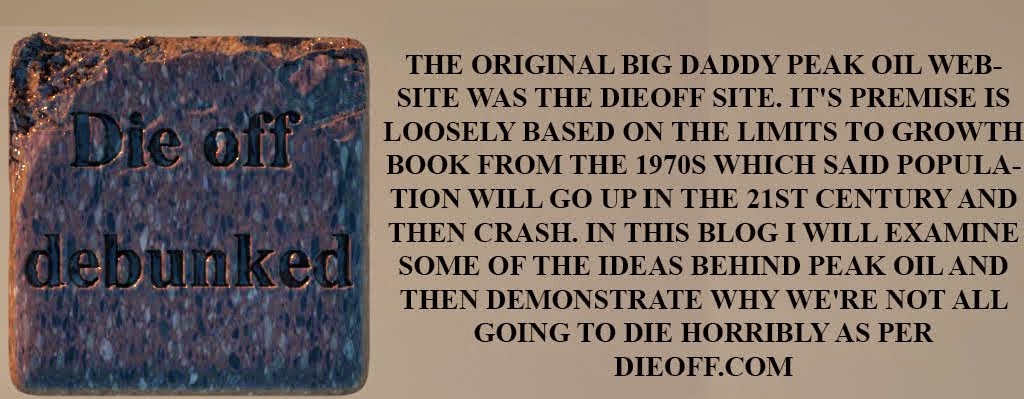Some doomers reckon that we are not only going to enter a period where conventional oil peaks but that also coal will peak, potash will peak, lithium will peak etc etc.
The one I'm interested in is electric cars, because I like driving and I don't want to give up my car.
So let's take a look at that.
A prius for example uses 1 kilogram (2.2 lb) of neodymium in it's motors, and each battery uses 10 to 15 kg (22-33 lb) of lanthanum and some 10lbs of lithium.
There have been some reports that we are doomed because China is currently the #1 supplier of rare earths and if China shuts off supply we are all doomed.
First all, because it's currently the #1 supplier doesn't mean there's none anywhere else in the world. There are significant resources in Canada and the US (not even considering Russia, Africa and Australia) that are simply just not cost effective to extract at current (ridiculously cheap prices ).
But let's ignore that for a minute and focus purely on the amount of material.
Are there substitutes for neodymium? Yes there are. Cobalt works and is about as abundant as neodymium. Additionally Dysprosium can be used. It's also not widely known but the reason we are currently dependent on neodymium is due to a crash R&D program in the early 80s by Sumitomo of Japan to find a replacement for Cobalt Magnets which at the time were the gold standard for delivering high magnetic field strength (and thus high torque). The major source of Cobalt at the time was Zaire, which was involved in the Cold War (remember that?) and the Soviets at the time took the world's main supply of Cobalt offline, thus leading Sumitomo to invent post-haste an entirely new high magnetic field strength magnet based on different materials. Given that China is attempting a strangehold on the market at the moment, what is the likelihood that there are enterprising companies trying to develop alternatives as we speak? Well as a matter of fact there are:
AC induction motors have been developed that completely eliminate the use of rare earths.
Or you could use software controlled systems such as that developed by Chorus technologies which also eliminates the requirement for rare earths also. Options, options. What to pick? Blueberry ice cream or Chocolate or Vanilla or Mint or… you get the picture.
Is there anything else can be done? Why yes there is.
Currently all electric vehicles have a single speed transmission, leading to the need for very large, very powerful electric motors. Several companies, including Zytek and Zeroshift are working on multi-speed gearboxes, which will greatly reduce the need for such large motors (by up to 10-30% by some estimates) meaning that the amount of rare earths required are reduced signficiantly.
Is there yet anything else?
Unlike oil, which is burned in the form of gasoline and the waste products vented to the atmosphere, worn out electric motors and batteries can be RECYCLED and as much as 90% of the original in place material could be re-used.
What about batteries?
Ongoing R&D in the materials required to produce batteries are prolific and there are several candidates on the drawing board which use significantly less lithium and/or have entirely different chemistries such as zinc/air.
And last but not least, despite their name the rare earth metals chemically are not that rare. Within the crust the most common rare earth metals (lanthanum to neodymium) have a similar crustal abundance to the less common base metals (zinc, copper, nickel and tin) and even the rarer middle and heavy rare earth metals are more common than silver. They are certainly nowhere near as rare as the precious metals, such as gold and the platinum group elements. To a certain extent this is reflected in the price of rare earth metals which generally fall somewhere in between the price of the rarer base metals and silver.
So what it comes down to in the end is this: you can pick your investment options and possibly end up picking the Microsoft of the new energy/new transportation paradigm or you can scoot on over to savinar's site and load yourself up with guns and ammo in anticipation of the impending zombie apocalypse.
My choice? I'm deciding whether to go to Maui or Disneyland for my next vacation.

3 comments:
From someone who lived in Maui and once worked at Disney go to Maui....
Dysprosium is far MORE scarce than neodymium, by over an order of magnitude.
Actually Gareth, dysprosium is only 5X as scarce as neodymium rather than the more than 10X as scarce as you state. Also since the quantities of dysprosium required are much less (70X less and neodymium is relatively abundant (about as abundant as cobalt - the previous best metal for high magnetic field composite magnets) I hardly consider this to be a problem. Especially since the technology from Chorus is about to eliminate entirely the need for "rare earths".
But nice attempt to set up a straw man.
Post a Comment